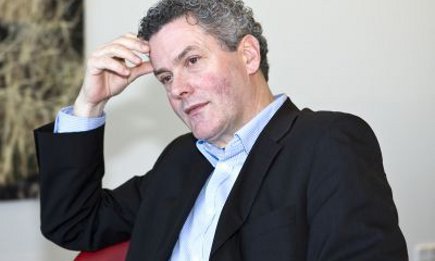Domino-effect voor excellentie

Tijdens de Dag van de Excellentie in Groningen – waar zijn hogeschool de gastheer was – wees Pijlman erop, dat een cultuuromslag bereikt lijkt te zijn en dat dit niet vanzelf ging en geen kleinigheid was. Dat zag men buiten ons land al enkele jaren geleden komen: “In an interview with ScienceGuide in 2012, John Zubizarreta, president of the National Collegiate Honors Council in the United States, said that honours education had risen to the top in the Netherlands, and that he knew of no other country so dedicated to honours.”
“He explicitly referred to the strong backing by governmental institutions. Even though I realize we are not yet where we want to be with honours education, I consider this a well-deserved compliment.”
De internationale gasten hield Pijlman voor, dat een land – en zeker een noordelijke provincie en landsaard – waar ‘doe maar gewoon…’ de culturele norm is, niet een vanzelfsprekende voedingsbodem voor Sirius-inspanningen genoemd kon worden. Nietemin lukte het honours breed tot bloei te brengen. Maar nu moeten volgende stappen gezet worden. Welke en hoe schetste hij in enkele lijnen voor de discussie op de stampvolle, jaarlijkse Excellentiedag.
U leest de rede van Henk Pijlman hieronder
Today, I want to tell you about one of our students, Sarah Drenth. After her first year of studying Speech Therapy, Sarah realized she needed a challenge beyond what her curriculum offered. After hearing about the honours programme, she applied and got accepted. Sarah chose a course on the philosophy of law, for which she wrote an essay on boat refugees. This was just before the summer of 2015. At that time, it was clear that the summer would see a great number of refugees entering Europe, due to ongoing conflicts in the Middle-East and the favourable weather conditions. Sarah felt a strong urge be part of the solution of this issue, because of both the terrible circumstances many refugees were in and the societal unrest that their arrival caused. She asked herself the question: what are you going to do when those people actually get here?
Sarah decided she wanted to influence the way people think and talk about refugees. During the Let’s Gro festival, an annual festival about the future of the city of Groningen, Sarah organized a dialogue between locals and refugees. A refugee told the story of his journey, his reasons for leaving his home and fleeing to the Netherlands. A volunteer who helped refugees get out of their boats first hand in Lesbos shared her experiences. And lastly, a panel of professionals who work closely with refugees exchanged their experiences. Groninger citizens were given the opportunity to ask questions.
What Sarah achieved with this dialogue, is what I’d like to call the re-humanizing of refugees. We read about them in the newspapers every day, and too often we just see numbers or blurred pictures of large groups of people. It is easy to form an opinion behind your laptop screen, but what happens if you talk to these people in real life? Sarah managed to show that behind these numbers in the newspapers are millions of individual human beings, with their own histories and their own hopes for a better future.
In the end, the session was not just talk. It was also a call to action, a brainstorm to think of and organize activities to bring refugees and people from Groningen together, and a rally to collect clothes.
This resulted in “Groningen Welcomes Refugees”, a foundation to be, which is currently initializing actions to help newcomers find their way in Groningen and the Dutch culture. Sarah will keep working with this foundation.
Sarah’s story shows us how honours education can enable students to go beyond their everyday study activities, to make a difference in our communities.
One aspect of her story I have not told yet, but is also very important. Often, honours students tell me their fellow students regard them as overachievers. But Sarah told me her fellow students were very enthusiastic when they heard about her project, because she addressed an issue that they all felt was of great importance. It was not about good grades, it was about using your talent to make a difference in other people’s lives.
The story of Sarah does not stand alone. The last couple of years I’ve seen many students and lecturers rediscover themselves, thanks to honours education and research. It is overwhelming to see what happens if you challenge people to find their talents and put them to use. I have seen students doing great work in local communities. Some helped those who struggle with their health, or with bureaucracy, others encouraged neighbourhoods to become energy independent.
I have seen lecturers who enabled these students to realize their full potential and at times perplexed themselves with the amounts of energy and enthusiasm they were able to stir up in classrooms.
Of course, I do not need to convince you what kind of impact recognizing and nourishing talent can have, for both individuals and society. You are here today to discuss how we can strengthen our honours education and research.
Before we do so, let me reflect shortly on what we already have accomplished. In an interview with ScienceGuide in 2012, John Zubizarreta, president of the National Collegiate Honors Council in the United States, said that honours education had risen to the top in the Netherlands, and that he knew of no other country so dedicated to honours. He explicitly referred to the strong backing by governmental institutions.
Even though I realize we are not yet where we want to be with honours education, I consider this a well-deserved compliment – for all of you as well.
One of the driving forces behind this success was the establishment of the Sirius Programme in 2008. The Ministry of Education, Culture and Sciences designed this programme to address the issue of fostering and promoting talent.
This was both a necessary and a daring step. The Dutch have a rather strong culture of egalitarianism in education. Hence, we even have a saying to expresses this. Translated to English it would read something like “just act normal, then you’re acting crazy enough as it is”. And of course, this inclusive culture has its benefits: all educational institutions offer a good basic level and are accessible to all students. Additional efforts are aimed at helping the less talented to keep up with their educational programmes. At the same time facilities for high-potential students were lacking. Their talents remained largely unused or even unseen.
This has changed. And I believe this is what Zubizarreta refers to. We can honestly say that we are better in in recognizing and encouraging talented students, lecturers and researchers than we were a few years ago. We have made good progress. But we can do better, and we need to do better.
Without pretending I have all the answers, let me share at least two ideas with you how this can be done. Let me start with the first idea, which I believe is rather easy to realize.
Easy, because we are doing it already; in fact, we are doing it right now. I’m talking about exchange, strengthening relations, and sharing knowledge. Last week, important steps were taken in this respect. The development of honours in the Netherlands is at a point where we are able to look over the Dutch borders. That is why representatives from different countries came together in Utrecht, to establish a European knowledge network for honours. In June, a follow-up conference will take place. This is a great achievement and a good start. But here is more that needs to be done.
A few suggestions.
-Traditional research Universities and Universities of Applied Sciences need to work together to share educational and research practices. If we seriously want make honours a success in our higher education institutions, we have to do it together.
-Part of this is to stimulate the mobility and exchange of excellent students and teachers, so they can learn from new surroundings and share their talents, experience and knowledge.
-Quick wins are possible, if we manage to use the opportunities of our digital era more effective than is currently the case.
-We should not just focus on exchange between universities. If we manage to include both secondary education and the professional practice in a culture of excellence, we can really have an impact. Some steps have been taken to bring honours to secondary education, and a dialogue with the professional practice about what it means and requires to be an excellent professional have started, but much work is to be done in these areas.
-To deepen our understanding of the dynamics and impact of honours education, to find out what works and what doesn’t and to keep improving an educational practice that is already the harbinger of innovation in education, we need to strengthen our honours research and share our findings.
Of course, all this still requires effort and commitment, but seeing what steps are being taken and the fact that you are here today, I believe this can be achieved without much delay. So, this was the easy answer. Now the more challenging one.
We need to embed honours in our institutional cultures. Earlier, I described the tendency to put a brake on those who stand out. Instead of emphasizing that normal is crazy enough, we should strive for a culture where talent is recognized, applauded and stimulated. But changing a culture is not easy.
We need ambassadors: students, lecturers, researchers, policy makers and managers. People like Sarah, who inspire their fellow students because they lead by example. We need people who recognize talent when it is in front of them and are able to simulate it. That is why our lecturers are so important. We need to train them and enable them to use their own unique talents, so they can use it to bolster the talents of others.
Reaching out to secondary education and the professional practice are also important for a domino-effect in the normalization of excellence. But perhaps one of our most important tasks is to challenge the prejudice that honours education is something exclusive, only for the lucky few with the right set of genes. This is nonsense. Talent can manifest itself in many ways, it is not just about grades.
If we manage to make the culture of honours an inclusive culture, where we focus on stimulating talents of all our students, on enabling talents instead of hiding them,
I’m sure even the Dutch can be convinced that acting excellent is crazy enough as it is.
Meest Gelezen
Vrouwen houden universiteit draaiende, maar krijgen daarvoor geen waardering
Hbo-docent wil wel rolmodel zijn, maar niet eigen moreel kompas opdringen
Wederom intimidatie van journalisten door universiteit, nu in Delft
‘Waarom het nu niet lukt om medezeggenschap in hbo te versterken’
‘Sluijsmans et al. slaan de plank volledig mis’



